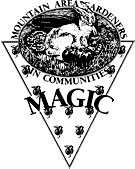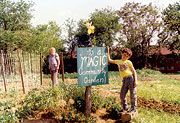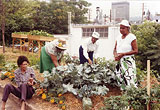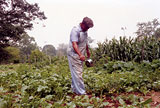 |
Community gardens may be all the rage today, but the concept is nothing new in Asheville. Beginning in the early 1980s and continuing until the spring of 2000, a nonprofit called Mountain Area Gardeners in Communities (MAGIC) blazed a trail here, maintaining as many as 13 community gardens outside of schools, housing projects, homeless shelters and other spots throughout the city.
An archive of MAGIC snapshots, fliers and news articles, recently obtained by Xpress, conveys the spirit of those projects. The yellowed materials depict locals of various races, ages and backgrounds working the soil at gardens at Aston Park Towers, the Senior Opportunity Center and homeless shelter Hospitality House, among other locations.

Claxton Elementary
|
Letters from the Asheville Housing Authority and homeless agencies heap praise on MAGIC’s program for its rehabilitative influence. There’s even an official statement from then-Mayor Louis Bissette proclaiming Oct. 17, 1988, to be “Community Gardening Day” in honor of the organization’s work.

Senior Opportunity Center
|
“The purpose was just to enable people to grow food, and teach people about organic gardening,” says Linda Blue, who sat on the organization’s board of directors from the mid-’90s until MAGIC shut down. She remembers the initial work that went into the garden on Pearson Drive, which is still a community garden, having been handed on to Bountiful Cities. “It was a dump site. We had to clear construction debris and convert completely worthless soil into something that could sustain a garden,” Blue recalls. As it developed, that garden came to be used as an educational tool, a function it still serves today.

Aston Park Towers
|
The one aspect of the project that wasn’t sustainable, however, was obtaining financial grants year after year. “They just got to that critical point where the funding dried out,” says Blue, adding that, as more and more nonprofits set up shop in Asheville, less money became available for MAGIC.
That’s the rub when it comes to idealistic visions of community agriculture: The very gardens that are meant to provide sustainable alternatives for the underprivileged can rarely do so without some form of outside financial backing. When funding ceases to be available or property ownership stands in the way, many community gardens wither away.
But as the saying goes, to everything there is a season. Just as MAGIC came to an end, the Bountiful Cities Project was beginning to sow seeds of its own.
The historical MAGIC materials obtained by Xpress have now been donated to the North Carolina Collection at Pack Memorial Library in Asheville. The library plans to make the collection available to the public soon.



Before you comment
The comments section is here to provide a platform for civil dialogue on the issues we face together as a local community. Xpress is committed to offering this platform for all voices, but when the tone of the discussion gets nasty or strays off topic, we believe many people choose not to participate. Xpress editors are determined to moderate comments to ensure a constructive interchange is maintained. All comments judged not to be in keeping with the spirit of civil discourse will be removed and repeat violators will be banned. See here for our terms of service. Thank you for being part of this effort to promote respectful discussion.